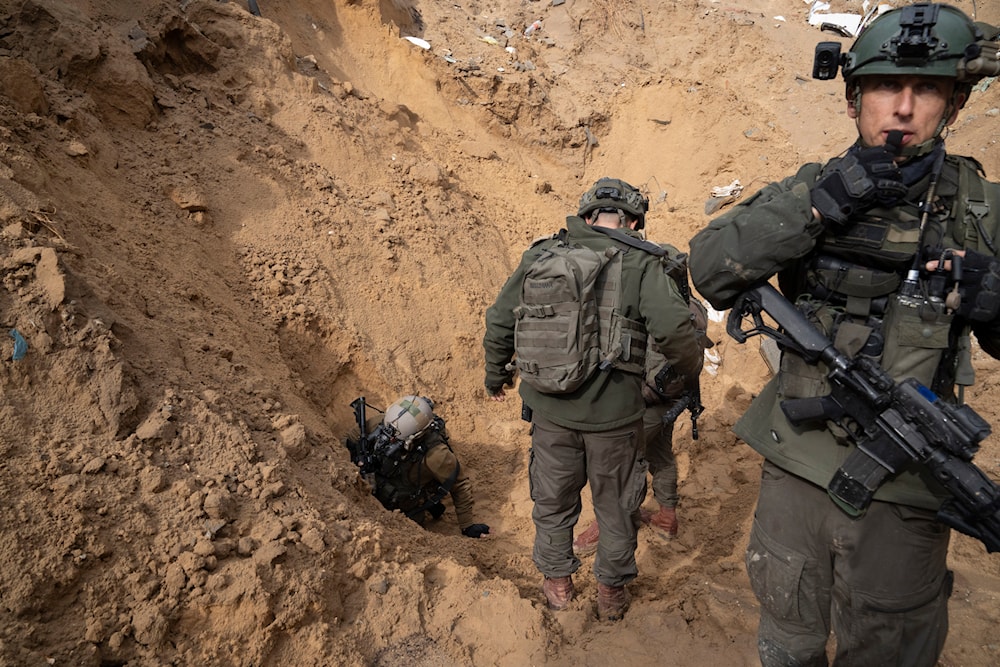'Israel' rejects Hamas ceasefire demands, talks in deadlock: Sources
The Israeli occupation rejected the demands made by the Palestinian Resistance in the ongoing ceasefire talks as the latter insists on four core demands.
-

Israeli soldiers deface a cemetery during the Israeli invasion of the Gaza Strip in Khan Younis, Saturday, January 27, 2024. (AP)
The Israeli occupation rejected the demands made by the Palestinian Resistance once again in light of the ongoing deadlock ceasefire talks, sources in the Palestinian Resistance told Al Mayadeen on Sunday.
Hamas had articulated four key demands: a ceasefire, the withdrawal of Israeli forces from Gaza, the return of displaced civilians, and a meaningful exchange of prisoners. However, leaked information regarding the Israeli regime's response indicates a significant gap between the two parties' positions.
The Israeli occupation's stance has been described as "inflexible" by the sources. Notably, "Israel" refuses the gradual return of displaced individuals, regardless of their demographic, and the establishment of new camps to house the hundreds of thousands of displaced individuals.
Additionally, regarding the exchange of prisoners, the Israeli occupation's proposed rates are seen as inadequate, leading to a significant reduction in the number of Palestinian detainees slated for release, the Palestinian sources added.
The deadlock in the negotiations and the rigid Israeli response clashes with Hamas and the Resistance's vision that any deal must align with their fair and flexible demands.
Cautious optimism
Qatar's Foreign Ministry spokesperson Majed al-Ansari said Tuesday the emirate was "cautiously optimistic" regarding a potential ceasefire in Gaza, with "technical" negotiations ongoing.
He said, "We are not close to a cease-fire agreement in Gaza, but we remain hopeful," adding, "The next major objective of the negotiations is to send a counter-proposal to Hamas."
Elsewhere in his remarks, al-Ansari emphasized that an Israeli invasion of Rafah would negatively impact the attainment of an agreement and lead to significant destruction and unprecedented atrocities.
This comes shortly after Israeli Mossad chief David Barnea returned to "Israel" from Qatar. The remainder of the Israeli delegation stayed in Doha to continue the negotiations.
Previous efforts to reach a deal between the two sides fell apart as the Palestinian Resistance demanded a ceasefire and the withdrawal of Israeli occupation forces from Gaza be the basis of a prisoner exchange deal, while the Israeli side insisted on short truces and refused to promise an end to the hostilities.
Earlier, on March 15, the Islamic Resistance Movement - Hamas announced that it had presented a comprehensive vision to mediators in Qatar and Egypt a comprehensive vision regarding its stance on halting the aggression on the Gaza Strip and the issue of prisoner exchange with the Israeli occupation.
The movement emphasized in a statement that this comes as part of its follow-up to negotiations through intermediaries to halt the Israeli aggression, provide relief and assistance to the Palestinian people in Gaza, facilitate the return of the displaced to their homes, and the complete withdrawal of occupation forces from the Strip.
In its statement, it stressed that its vision is based on these principles and foundations, which it considers vital for any agreement, and that it will remain committed to the rights and concerns of the Palestinian people.

 3 Min Read
3 Min Read








